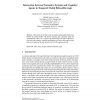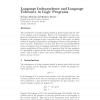89 search results - page 2 / 18 » A logic for ignorance |
ISIPTA
2005
IEEE
13 years 12 months ago
2005
IEEE
Logic and probability theory have both a long history in science. They are mainly rooted in philosophy and mathematics, but are nowadays important tools in many other fields such...
DAGSTUHL
2007
13 years 7 months ago
2007
Abstract. While some recent frameworks on cognitive agents addressed the combination of mental attitudes with deontic concepts, they commonly ignore the representation of time. An ...
DAGSTUHL
2007
13 years 7 months ago
2007
We explain the raison d’ˆetre and basic ideas of input/output logic, sketching the central elements with pointers to other publications for detailed developments. The motivation...
ICLP
1994
Springer
13 years 10 months ago
1994
Springer
The consequences of a logic program depend in general upon both the rules of the program and its language. However the consequences of some programs are independent of the choice ...
AAAI
2007
13 years 8 months ago
2007
A team of agents is jointly able to achieve a goal if despite any incomplete knowledge they may have about the world or each other, they still know enough to be able to get to a g...


